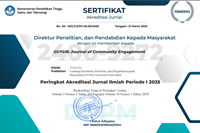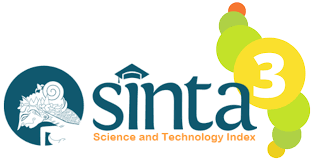Ethnomathematics Concept for Learning at High School in Bali
(1) * I Made Dharma Atmaja

 (Universitas Mahasaraswati Denpasar)
(Universitas Mahasaraswati Denpasar) Indonesia
(2) Putu Suarniti Noviantari (Universitas Mahasaraswati Denpasar)
Indonesia
(3) Maria Kristina Bria (Universitas Mahasaraswati Denpasar)
Indonesia
(4) Ni Made Yeni Sapitri (Universitas Mahasaraswati Denpasar)
Indonesia
(*) Corresponding Author
AbstractThis community service program is focused on improving the quality of mathematics learning at SMA Negeri 2 South Kuta, especially in terms of variety and alternative learning resources. The main issues faced are the lack of varied learning resources and the lack of optimal scanning of innovations in learning to other teachers. The purpose of this service is to increase the understanding of the concept of Ethnomathematics and encourage its application as an alternative learning resource for mathematics teachers at SMA Negeri 2 South Kuta. The method used is mentoring with two sub-topics, namely providing an understanding of the concept of Ethnomathematics, the relationship between culture and mathematics, cultural approaches in learning, and the benefits of Ethnomathematics, and emphasizing the importance of understanding the social context in learning, inclusive learning, and connecting mathematics with the context of students' lives. Mentoring is carried out in four stages including planning, preparation, implementation, and evaluation. Pre-test and post-test are used to measure the initial understanding and improvement of teachers' understanding related to Ethnomathematics. The mentoring succeeded in increasing teachers' understanding of Ethnomathematics. There was an increase in the average pre-test and post-test scores of 15.69%. Six teachers managed to achieve the maximum score on the post-test, while the other five teachers showed a significant increase in comprehension. These results show that mentoring has succeeded in making a positive contribution in improving teachers' understanding of Ethnomathematics |
Keywords
Full Text: PDF
Refbacks
- There are currently no refbacks.
Copyright (c) 2024 I Made Dharma Atmaja, Putu Suarniti Noviantari, Maria Kristina Bria, Ni Made Yeni Sapitri

This work is licensed under a Creative Commons Attribution-ShareAlike 4.0 International License.
This journal is licensed under

Creative Commons Attribution-ShareAlike 4.0 International License.








.png)

